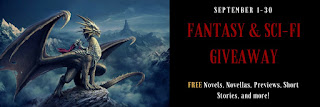Sounds like a pretty neat idea? An online reading experience with a soundtrack...
YES!
I was introduced to
booktrack last fall by
Chazz Hill-Hayr, singer-guitarist for
FWD. My experience has been this: FUN! This free tool is an invaluable author resource. After copy-pasting your story into a new project, it's just a matter of minutes before you're dragging some sound excerpts overtop of the text and you're good to go. You can then playback and mix the audio to taste, tweaking volume and fade-in and fade out settings. The simplicity of the interface is almost disarming. I was able to get up to speed in less a day and was well into making my first booktrack.
Truthfully, I was taken by surprise by the amount of audio there is to choose from. Every genre imaginable
—from world, celtic, new age, rock, classical, to pop, jazz, orchestral, epic, funk and much more
—if that is not enough, possible to upload your own... Some of the tracks have styles and quality reminiscent of Hans Zimmer and John Williams. You can search by category (there are many categories to choose from), or by mood, or you can type in a phrase reminiscent of a track you would like in your story, like 'airplane' or 'lion roar' or 'quiet strings' or something like that, and then select from the matches.
From the reader's perspective, readers can play back the story at variety of speeds, or let the story auto-adjust to their reading rhythm. A bonus.
The audio the author chooses is completely arbitrary. It's a good idea to stick to themes, but interesting to note that there is no limit to the the number of tracks that can be layered on top of each other, thus creating amazingly rich results. So, for all audiophiles out there
—booktrack is a dream.
The accompanying audio can be made as thin or thick as desired: from muted ambient to multi-layered symphonic scores. I like to thicken it up, to create a dramatic mood. Not only because I'm a bit nuts, but because I spent my early days cloistered in a studio mucking around on 4-tracks and 8-tracks composing tons of electronic music.
Perhaps the most powerful capability of booktrack is its ability to add mood and ambience to a story which would not otherwise be possible in a regular ebook read.
It's also very entertaining to add effects, and, in conjunction with the music, I think this to be the closest authors can get to making a 'movie' out of their books on their own resources.
To sum up my experiences:
(*) booktrack enhances the overall reading experience.
(*) is free.
(*) easy to use.
(*) audio is readily available (and possible to upload custom audio).
(*) is a great promo tool for authors and musicians.
(*) offers an unlimited flexibility of style of presentation.
(*) is simple to edit of existing work, or add additional chapters to current releases.
Did I mention author promotion?
YES! A GREAT way to promote ebooks. It's an easy investment: soundtracking an intro chapter or two or a sample excerpt, or short story and tagging it with links to Amazon, Smashwords, ITunes, etc...
It's possible to create your own
author page, listing your works and bio.
I posted a booktrack link to the
prologue of Denibus Ar, an archaeology adventure, as a teaser on a
LibraryThing giveaway (till April 7). Similarly, sample episodes I posted for the fantasy-adventure, The Relic Retriever on a
LibraryThing giveaway (until April 18). One episode,
Lim-Lalyn, is a romp through the Xanthian desert on a treasure hunt. Another,
The Isk Rider of Bazuur, is a mystery and adventure focused on unveiling a masked marauder.
It's possible to embed booktracks right in your
website, thanks to new functionality supplied by booktrack. Readers don't have to leave the author's page to experience the rich audio component. If they don't like reading online? Readers can download the booktrack
app and read on their phone.
My latest releases are
Pirates of the Poesasian ... and
Grinneth, a jungle and sea adventure. This has been featured on the booktrack main page, featuring an eclectic mix of tribal and classical music.
Give it a spin! Hope you have many fun hours creating awesome soundtracks to your books!
ps> Tutorial
here on how to use booktrack.
And here are some sample booktracks to show what kind of textures it's possible to create:
Magical Entities Are Not For Sale (young readers, easy listening, acoustic/atmospheric themes)
The Movie Maker (near future SF, techno/rock themes)
Curse of the Crugmut (dark fantasy, Lord of Rings, classical themes)
Wolf's-head : The Yard (comic fantasy, uses 'Bugs Bunnyish' themes with 'Punch and Judy' effects)
Wolf's-head : Prince of Ogres (more of the same)
Audra (SF space horror, spaceship battles, alien noises, alien planet ambient sounds)
Ahrion's Minions (sword and sorcery, zombie thriller, suspense themes with creature effects)
The Jisil-ou-az-lar (far future SF, ethereal, ambient synth styles)
Tournament at Bergum (heroic fantasy, horns, strings, sword battles)
Phane (young adult SF, electronika from my 'New Horizons' album)
The Brain Machine (SF, techno themes)
Koruka's Prophecy (historical fantasy, world music, Egyptian themes with desert and tomb effects)
Flowerfly (YA SF, classical, easy listening themes)
The Bones of St. Isis (adventure fantasy, mixed styles and classical)
Enchantress of Rurne (heroic fantasy, dark, atmospheric and world music themes)
Lim-Lalyn (fantasy adventure, desert battles and classical, tribal, mid-eastern themes)
The Isk Rider of Bazuur (fantasy adventure, mixture of synth, pop, classical)
Grinneth (fantasy adventure, tribal, shaman, sea adventure, creature effects)
Pirates of the Poesasian (adventure, sword fight effects and classical music)
Visit my
author page for updates...







